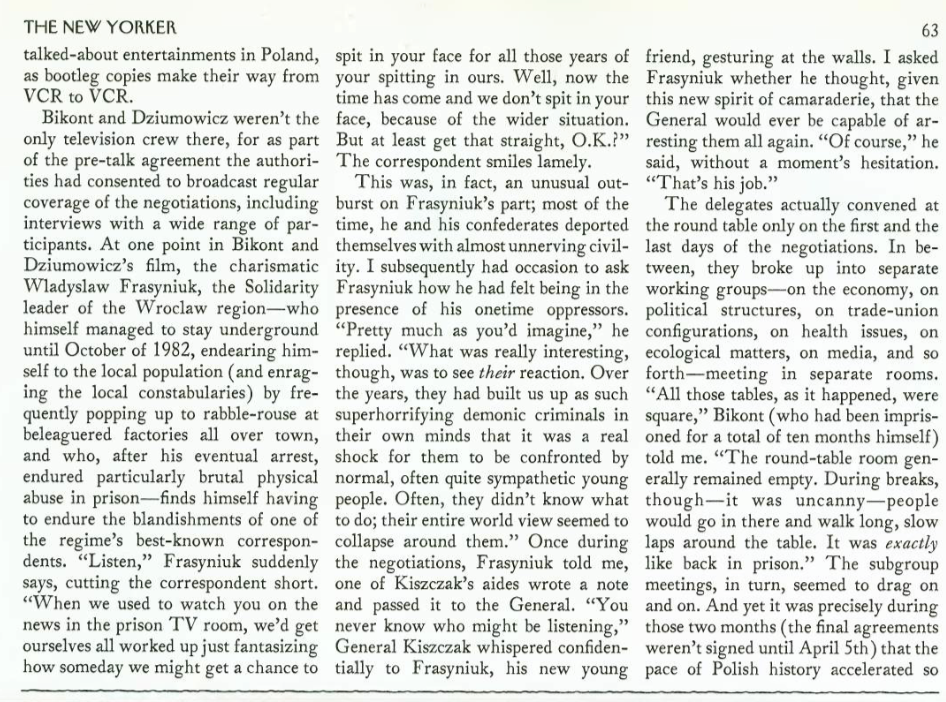The Case for a Negotiated Transition
Plenty of Venezuelans see the idea of a transition negotiated with chavismo as almost too ridiculous for words. What if we're wrong, though?


Plenty of Venezuelans —including, on certain mornings, the one that stares back at me from the mirror— regard the idea of a transition negotiated with chavismo as almost too ridiculous for words. So Abraham Lowenthal has his work cut out for him in arguing for such a thing in Foreign Policy.
He does it deftly, though, by pointing to successful negotiated transitions in other countries with governments just as recalcitrant and anti-democratic as ours…and often much more violent:
In Brazil, Chile, Poland, Spain, and elsewhere, such leaders have inspired hope by articulating a positive and inclusionary vision of the future without arousing unrealistic expectations of immediate and total change. They have found spaces and means for informal dialogue to explore ways to move forward, such as the “talks about talks” between the African National Congress and unofficial representatives of the South African government or the Round Table discussions between the Communist government and Solidarity in Poland. They have encouraged those within an authoritarian regime who seek a safe exit that this might indeed be possible, while excluding those among the opposition who reject compromise or threaten the use of violence — as was necessary in Brazil, Chile, and Spain. They have improved electoral laws and created independent electoral authorities to build trust in the electoral process, as occurred in Mexico over several years.
Notably, successful transition leaders around the world — again, from both incumbent regimes and oppositions — have had to make compromises, even painful and unpopular ones, preferring modest advance to heroic defeat. In 1988 in Chile, Patricio Aylwin, leader of the united opposition to the Pinochet government, prevailed after bitter disagreement among opposition groups in securing the opposition’s participation in a plebiscite, despite the risk of legitimizing Pinochet. This decision made possible the dictator’s historic ouster. In Brazil in 1986, Fernando Henrique Cardoso and other key opposition leaders succeeded in dialing down the public clamor for “direct elections, now,” resisted by the military government, agreed to contest the elections under the military’s rules, named a civilian official of the military government as the opposition’s vice presidential candidate, and won the indirect presidential elections that ended military rule. And in 1989-90, the leaders of Solidarity and its democratic allies accepted the participation of the Communists in the first democratically elected government of post-Communist Poland.
The architects of previous democratic transitions learned the delicate art of mobilizing international support without being perceived as instruments of foreign intervention, as illustrated by the ANC in South Africa and, indeed, by skilled opposition leaders in each of the countries mentioned above. They asserted their commitments to constitutional freedoms while ending gross human rights violations, such as the detention of political prisoners and the threat of incarceration for legal protest. And they developed modes of documenting abuses, recognizing and sometimes compensating victims by appointing Truth and Reconciliation commissions or other such bodies, without seeking revenge or exacting full justice in the fraught conditions of a democratic transition.
They found ways to recognize each side’s contributions to national progress. And they worked together on necessary economic and social changes, as illustrated by Spain’s Moncloa pact among political parties, business organizations and trade unions. Often they cooperated with humanitarian relief programs and international financial institutions to begin the process of economic recovery. In most of these countries — and especially in Chile, Spain, and Brazil — opposition leaders invested time and effort to build unity among the democratic opposition, eliciting personal and party sacrifices to achieve shared goals and developing clear programs for governing.
All these challenges face Venezuela today. They are difficult, but they need not be insurmountable. The circumstances of South Africa, Chile, Indonesia, Brazil, and other countries were arguably much more hostile to peaceful democratic transition than those facing Venezuela, but creative approaches were found by those deeply committed to fashioning them.
I still think the most instructive case of this is the Polish transition, both because the pre-1989 Polish regime was exactly as economically self-harming as chavismo, and because to many Solidarity activists the prospect of sitting down and negotiating with those people —people who’d murdered thousands of their fellow activists and imprisoned thousands more for over a decade, in some cases — was every bit as stomach turning.
Amazingly, unbelievably, a negotiation with that government was made to work. And hard though it is for us to quite grasp it, their starting conditions were just as bad as ours.
I mean, seriously:
Caracas Chronicles is 100% reader-supported.
We’ve been able to hang on for 22 years in one of the craziest media landscapes in the world. We’ve seen different media outlets in Venezuela (and abroad) closing shop, something we’re looking to avoid at all costs. Your collaboration goes a long way in helping us weather the storm.
Donate





